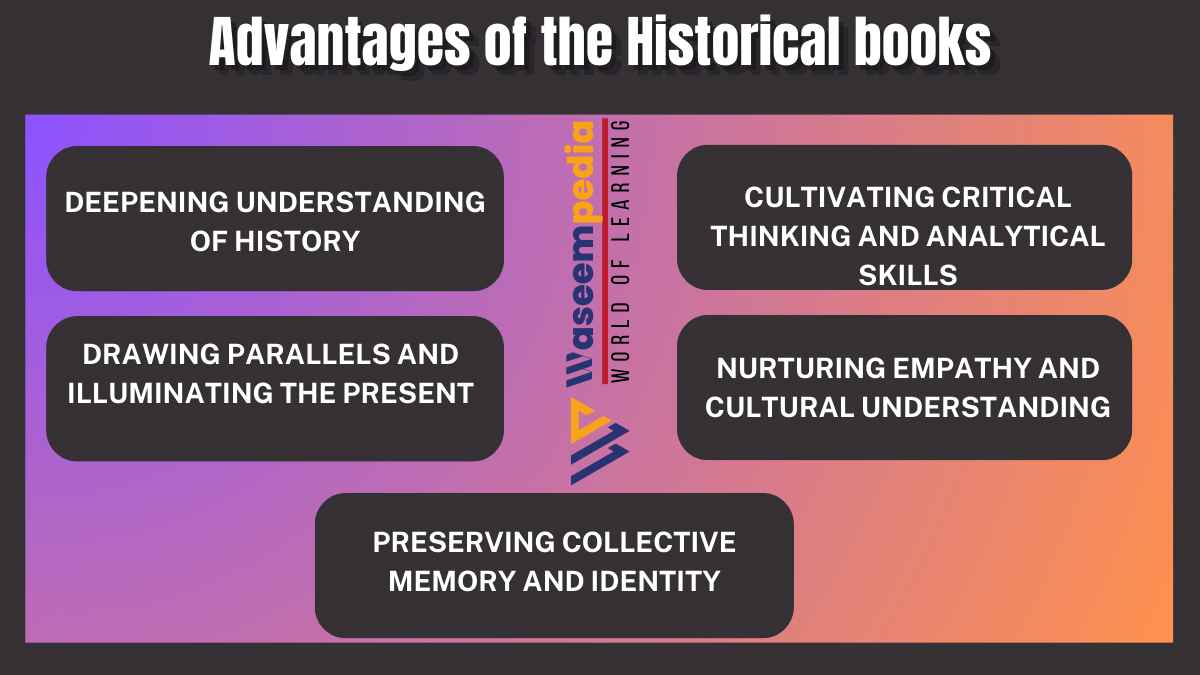Historical books offer a treasure trove of advantages to readers. They deepen our understanding of history, cultivate critical thinking skills, and illuminate the present. Through historical narratives, we gain insights into the past and draw connections to the present, nurturing empathy, cultural understanding, and a sense of identity.
So, embark on a journey through time by immersing yourself in the pages of historical books and unlock the secrets and wisdom of the past.
Historical books hold a unique place in the literary world, offering readers a window into the past. Through captivating narratives, meticulous research, and insightful analysis, historical books provide valuable insights into the events, people, and societies that have shaped our world.
In this article, we will explore the advantages of reading historical books, highlighting how they deepen our understanding of history, cultivate critical thinking, and illuminate the present.
5 Advantages of historical books
5 Advantages of historical books are as following.
1. Deepening Understanding of History
One of the primary advantages of historical books is their ability to deepen our understanding of the past. These books delve into historical events, offering detailed accounts that go beyond what is taught in textbooks.
Through meticulous research and analysis, historians provide a comprehensive view of the circumstances, motivations, and consequences surrounding pivotal moments in history. By reading historical books, readers gain a more nuanced and well-rounded perspective, allowing them to develop a deeper appreciation for the complexities of the past.
2. Cultivating Critical Thinking and Analytical Skills
Historical books encourage critical thinking and analytical skills. As readers engage with historical narratives, they are presented with a variety of perspectives, interpretations, and conflicting accounts.
This prompts readers to question, evaluate evidence, and form their own opinions based on the available information. Historical books challenge readers to think critically, weigh different viewpoints, and consider the biases and limitations of historical sources.
This analytical approach extends beyond the pages of the book, equipping readers with the skills to evaluate information and navigate the complexities of the world around them.
3. Drawing Parallels and Illuminating the Present
Reading historical books allows us to draw parallels between the past and the present. History often repeats itself, and by studying the lessons and experiences of previous generations, readers can gain insights into contemporary issues and challenges.
Historical books illuminate the social, political, and cultural dynamics that have shaped our current world, helping readers make connections and understand the roots of present-day phenomena. By recognizing patterns and understanding historical context, readers can make more informed decisions and actively participate in shaping the future.
4. Nurturing Empathy and Cultural Understanding
Historical books provide a platform for exploring diverse cultures, societies, and experiences from different time periods. By immersing ourselves in the narratives of historical figures, we gain a deeper understanding of their lives, beliefs, struggles, and triumphs.
This exposure to diverse perspectives nurtures empathy and fosters cultural understanding. Historical books challenge stereotypes, promote tolerance, and encourage readers to embrace the richness and complexity of human history.
5. Preserving Collective Memory and Identity
Historical books play a vital role in preserving collective memory and identity. They capture the stories of individuals, communities, and societies, ensuring that their experiences are not forgotten.
By reading historical books, we honor the legacy of those who came before us and gain a sense of continuity with the past. Historical books contribute to the formation of cultural identity, providing a shared understanding of our collective history and shaping our sense of belonging.

